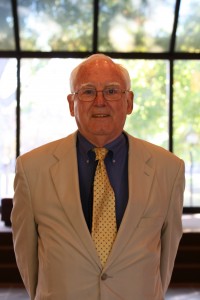Professor Emeritus of History Don Smith began his teaching career in the 1960s at his alma mater, Yale University. Professor Smith taught at Grinnell from August 1970 until his retirement in 2006.

How would you describe your teaching experience at Grinnell College?
My teaching at Grinnell College has been very rewarding; I like the educational atmosphere here, and one thing about Grinnell students is that most of the students do most of the work, and I’ve had very good students, some of whom have pursued advanced degrees in history, but I suppose that the career that has taken most of my students is law. Grinnell College has been a good place for me to teach, and provided me with lots of opportunities that I might not have had in other places. I guess the foremost is the Grinnell-Nanjing exchange, which I benefited a lot from.
What are the differences between students in China and students in the states?
The students that I have taught in China were all graduate students, so that’s a little different from teaching at Grinnell College. I would say that when I first went to teach, my students were not used to American-type discussion, seminars and classes. So I adjusted to that. The last time I was over there, it was much more free-flowing and we had a lot of good questions and ideas. I think the difference between higher education in America and in China has diminished over the years.
Apart from China, are there any other places that you have taught courses?
No. I’ve given single lectures at other places, but I have not taught a semester elsewhere. Because my field is the history of Great Britain, I spent a lot of time in England, though.
How would you characterize students at Grinnell at opposed to students at Yale or other research universities?
I taught some graduate students at Yale the last year I was there. But before that, I always taught undergraduate students, and I had undergraduates in seminars about the size of a Grinnell seminar. I am actually more impressed by the similarities than the differences between students I taught at Yale and students that I taught at Grinnell.
What are the similarities?
Intellectual curiosity and a capacity to develop as writers and thinkers. I think those two things go hand in hand; your writing is an expression of your thinking, but it’s not just a matter of putting down on paper what’s already in your head. Active writing itself causes you to think about things that you haven’t thought about until you start to write about them. That was true for my students at Yale and has been true for my students at Grinnell.
Do you miss teaching?
I have to say that, if I could be guaranteed that I would always have seminars like the last two I’ve taught at Grinnell, I would miss that. But I feel lucky that I kind of went out on a high point in my teaching. I didn’t mind teaching introductory courses, and you get a better range of people in them when they are first-year courses. For introductory courses, you spend a lot more time reading papers, editing papers, making suggestions and adding comments. In contrast, in the last two seminars that I taught, I just learned a tremendous amount from what my students wrote and reading their papers was a pleasure, not hard work.
How do you think of the way in which history is taught has changed over the past few decades?
The subject matter, I think, has changed more than teaching methods. For example, my research interest on British constitution and political history is far less common in the academic world than it used to be. On the other hand, things that are now part of history curriculum had barely made their appearance back in the 1960s, such as the history of women. I must say that I didn’t change much as a teacher between when I started and when I finished. My own approach to teaching hasn’t changed very much. What I had my students read changed, because you want your students to read the best of recent scholarship.
How do you view the connection between history and politics?
I had a student here last week. He was reminiscing [about] his time here, and I am really interested in politics; I’ve been a democratic activist ever since I came here, but he said that he never knew that I was politically involved or engaged from taking my courses, and it came as a surprise to him as we got to know each other later that I was so political. I think that’s one of the best things you can say about me, because I always made a point of keeping my politics from my teaching. I really do not believe that a student who knew nothing about me except what I was teaching in class could have had any idea of what my own political opinions were. What you want to be able to do in teaching is to encourage students to use their imaginations to understand history from the historical subject point of view, not from your view.
What are your plans for the future?
I plan to write an article about the parliamentary government—how the idea began in France as a result of French people understanding the way that the British government worked in the nineteenth century and the British people did, partly because they were not tied to receive ideas about the British government. That’s something that I’ve lectured on, but more needs to be done.
-compiled by Kevin Hong


















































